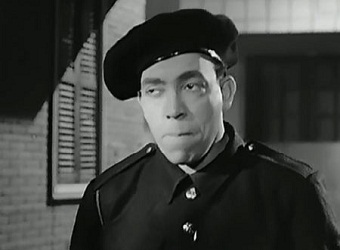Today marks the 43-year anniversary of an Egyptian artist, actor and comedian Ismail Yassin’s death.
Born in 1915, Yassin’s artistic path started in the 1930s at the age of 17 when he left his home town Suez – where his father had been put into prison due to outstanding debts – for Cairo, with only 6 Egyptian pounds (US$0.79) in his pocket. His plan was to study music, as people had told him he had a nice voice.
He started his career as a monologue singer and headed for Cairo after Abo El Seoud El Ebiary, the comic screenwriter and his best friend and life partner had discovered him and had helped him to join Badi’a Masabny’s troupe.
His break into the movie industry came when Fouad El-Gazaery gave him his first role in the movie “Khalf El-Habayeb” in 1939. He later joined Ali El-Kassar‘s troupe and started to gain widespread recognition eventually becoming one of most popular stars in the Arab world. A record 15 movies used his name in their titles to capitalize on his fame, most of them were written by Abo El Seoud El Ebiary.
He was widely known for manipulation of his facial expressions and often made fun of his ‘large mouth’ in his films. His trademark gimmick was to act terrified bringing his wobbling knees together, stretching his shaking arms in front of him, stammering silently, and suddenly snapping out of his panic with a loud inhalation of air. In the 1960s his health began to deteriorate. He moved to Lebanon where he participated in a number of films, and later when he returned to Egypt he was heavily in debt. He died of a heart attack in 1972. His son, Yassine Ismail Yassine, is also famous Egyptian film director.
During his career, which started in 1935 and lasted until his death in 1972, Yassin acted in hundreds of films and around 60 plays, shaping the history of Egyptian comedy.
“If I had continued to sing I would have been begging today,” Yassin told journalist Taher Abu Zeid in an interview for Garab Hazak radio programme in 1956.
During the early 1950s, Yassin formed a trio with writer Abu El-Saoud El-Ebiary and director Fateen Abdel-Wahab, and the three made many iconic films together.
In this period he started to make many of the films that take his name, such as ‘Ismail Yassin in the Army’, ‘Ismail Yassin in the Navy’, ‘Ismail Yassin in the Secret Police’, ‘Ismail Yassin in the Wax Museum’, ‘Ismail Yassin in the Mental Hospital’, among many others.
These films followed a particular comedic format which made audiences laugh for decades. This format included actors Riad El-Asabgy (who usually played El-Shawish Atteya), along with Zeinat Sedky, Abdel-Fattah El-Kosary and Abdel-Salam El-Nabolsy.
Yassin was also involved in the theatre, acting in more than 60 plays.
“Theatre is a machine that is alive, whereas cinema is silent,” Ismail said in his interview with Garab Hazak.
He put all his money into established a theatre company with writer El-Ebiary and spent the 1950s and 1960s supporting this company.
“I am very happy because I created something missing from the country – comedy theatre,” he commented on Garab Hazak.
In spite of the actor’s success, the end of his career in the late 1960s and early 1970s did not serve him well. Due to the nationalisation policies adopted by President Gamal Abdel-Nasser, which had an effect on the cinema and theatre industries, the actor’s theatre company was forced to close in 1966. Yassin went bankrupt and fled to Lebanon, where he did some small roles that did not reflect the actor’s legacy.
Yassin came back to Egypt and passed away from a heart attack in 1972 while filming ‘Sadness in Laughter’, which starred Nour El-Sherif. His films continue to this day to be aired on Egyptian as well as Arab television.
